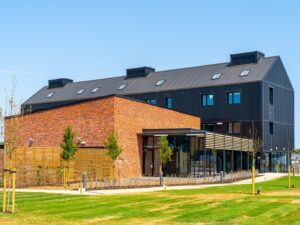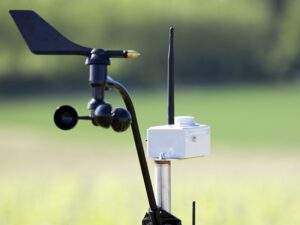Looking ahead and forward planning have long been key elements to farmers’ success – and bringing innovation and collaboration into the mix makes for a powerful combination. Producers have a fantastic opportunity to make the most of both at this year’s British Pig & Poultry Fair, helping them to ensure a sustainable and low carbon future for their businesses.
Profiling exciting new technologies and advice on topics like disease management and alternative proteins, the Fair is focusing on the key themes of innovation, collaboration and sustainability. “Ultimately, it is the job of everyone in the supply chain to work together to reduce the industry’s carbon impact, and new thinking and technology provide some of the answers here,” says Fair organiser Alice Bell.
The Innovation Theatre, new to this year’s Fair, brings together a host of new products and ideas. One example is Boehringer Ingelheim’s new ‘listening’ system for pigs, SoundTalks. Using artificial intelligence and machine learning algorithms, the system ‘listens’ to the pigs 24/7 and, based on frequency and intensity of coughs, alerts the producer to the onset of potential respiratory disease.
In a study of 1,655 pigs challenged with PRRS and Mycoplasma hyopneumonaiae, alerts generated by the system enabled issues to be detected five days earlier than human observation alone. With more rapid treatment and management, this was calculated to improve daily growth rates by an average of 12.7g, reduce antibiotic treatments by 23.4%, and generate a return on investment of 1:4.3.
Both pig and poultry producers stand to benefit from a new digital product from Livetec Systems, which will revolutionise biosecurity control and help farmers to contingency plan for any emergency, from flooding to a notifiable disease outbreak. “This is critical when farm businesses are under pressure to respond quickly, as it details everything that those coming on to the farm will need to know, as well as informing the farmer of how these next steps will play out,” says Julian Sparrey, Technical Director at Livetec Systems.
Egg producer, James Baxter, will join Livetec to speak about how a robust contingency plan saved him £45,000 in compensation alone, by saving time – and therefore mortality – before depopulation could start following an avian influenza outbreak. “What we really want to highlight is the importance of being prepared so you can react quickly to protect your business,” says Julian.
Another Innovation Theatre session will explore the circular economy from the perspective of animal bedding. The 2050 Group is creating a new highly absorbent straw crumb which will be provided free, on long term contracts to farmers, where the manure is made available to be processed into biomethane, Bio-CO2 and biobased fertiliser.
“This fertiliser can be used to displace predominantly imported fossil fuel fertilisers, to grow the next cereal crops and their resultant straws, which begins the process again,” says CEO James Dornan. “It keeps repeating each year in perfect harmony with nature.”
In addition, there will be a forum on insect farming, with Beta Bugs and Flybox talking about their combined solution which takes complexity and cost out of insect farming, by supplying eggs and larvae in containerised systems. “Demand for insect protein as alternatives to existing feed ingredients is increasing, making insect farming a mainstream opportunity,” says Dr Thomas Farrugia, CEO at Beta Bugs.
Visitors to the Fair will also be able to meet and gather ideas from around 330 exhibitors. And they can listen to expert speakers in the specialist Pig and Poultry Theatres. “This is a chance to discuss the challenges and topical issues of the day,” says Dr Charlotte Evans at AHDB. “As an industry we can tackle the road ahead together and celebrate our successes – it’s all about collaboration and sharing ideas.”
The headline sessions in each theatre will be the popular pig, egg and poultry meat outlooks, which will see speakers from throughout the supply chain share their views on the challenges and opportunities ahead. Other pig forums include contingency planning for African Swine Fever, and a practical workshop looking at how slurry and waste management can help farmers on their journey to net zero.
A specialist session in the Pig Theatre will examine how to encourage younger people to eat more pork, while the Poultry Theatre will explore upcoming grants under Defra’s Animal Health and Welfare Partnership for investment in new equipment and infrastructure.
Fair partner ABN will be looking at how precision feeding and finding sustainable soya replacements will be a key part of reducing carbon emissions and improving efficiencies. And lifecycle feed analysis will help them to determine their feed carbon footprint, says Danny Johnson at ABN. “This enables them to benchmark where they are currently, before working together to explore alternatives to reduce their carbon footprint and improve their bottom line.”
- The British Pig & Poultry Fair takes place on 15-16 May at a new venue – the National Exhibition Centre in Birmingham. To find out more and register for your FREE ticket visit www.pigandpoultry.org.uk






